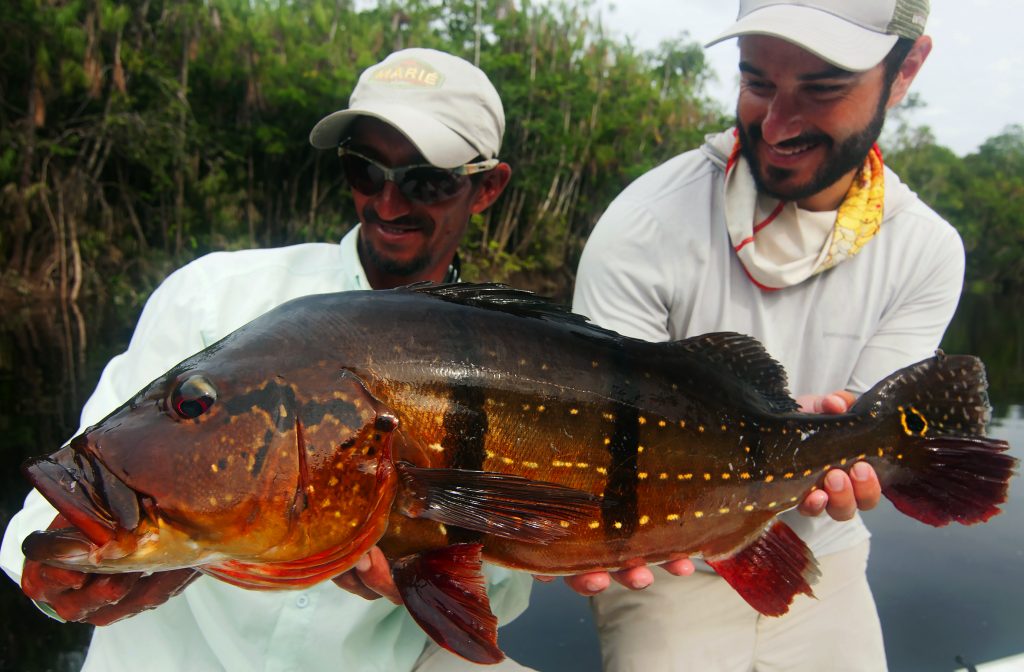The Marié River Reserve is remote, restricted and loaded with 20-pound peacocks.

They call the Marie in northwestern Brazil, “Rio de Gigantes” or “River of Giants” and the 500-mile long tributary of the Amazon River seems to produce the trophy size peacock bass to prove that moniker each year. According to detailed records kept by the exclusive outfitter, Untamed Angling, over the past three seasons 176 giant peacock bass weighing 20 pounds or more have been caught by a total of 268 anglers visiting the Marie River watershed. While those stats alone are promising to fisherman, another 408 fish between 15 and 20 pounds were also caught over the same period.
In the recent 2017 season alone, there were 21 speckled peacock bass (Cichla temensis) over 22 pounds with lengths between 80 to 91 cm caught and released in the watershed. The largest fish landed is a new pending IGFA World Record caught by Marcel Griot. The massive 30-pound, 13-ounce (14 kg) fish was caught on November 22, 2017 while fishing Marie River lagoons with the outfitter Untamed Angling. Griot caught the fish on a 7-inch High Roller topwater lure, and released it alive after weighing and documenting the trophy. If approved, the catch will replace the current All-Tackle record of 29 pounds, 1 ounce.
Griot also caught last season’s second biggest fish, a 27.5-pounder, on the same topwater plug that same day. The third largest peacock of 2017 caught in the Marie River weighed 26.4 pounds and was caught about a month earlier by a fly fisherman on a popper fly. The most significant monster peacock bass taken in the entire Amazon on a fly however was caught and released in the Upper Marie River in the previous season. On September 26, 2016, a German angler, Florian Kaiser, caught what is reported to be the largest peacock ever taken on fly rod, a 92 cm long fish weighing 28.5 pounds. He was using his own personally-tied 3/0 Deceiver fly in white/grey on a 9-foot, 9-weight rod and 40-pound tippet. These stats are very impressive!

The Marie is a true trophy fishery and not one that yields huge numbers of fish. Anglers who want to focus on the smaller butterfly peacock bass can catch quite a few 2- to 6-pounders in the near-shore cover. While the fishing can be tough for constant activity, the remote waters do yield a higher percentage of 20-pound peacock bass than most every other river in the Amazon. And they have a strict catch-and-release policy.
On my most recent trip to the Amazon, I visited the Marie for the first time. After 60 trips to the Brazilian jungle, I have fished around 40 different rivers with fairly good success. Outfitters Rodrigo Salles and Marcelo Perez joined me on the venture to help me check out their trophy-focused operation. Since my interests lie in giant peacock bass, I was excited to have a crack at the Marie. It didn’t take long to find out the waters did hold some big fish.
Fishing with a Brazilian angler, Ricardo Borges, we caught 18 butterfly peacocks on day one and I managed a 13-pound speckled peacock. We found out at dinner that night that one of Ricardo’s friends on the trip caught two giants that weighed 22 pounds each, and there were a few others in the mid- to upper teens taken that day. Ricardo and I tied on some different baits and headed out the next morning after something similar.
About 10 a.m., I tossed a jig into a lagoon cut and tussled with an 18-pounder, a good start to the day. Ricardo hooked a giant at least that big on a 6-inch long tail-spinner topwater plug, and fought it for maybe two minutes before it pulled off. One of the requirements imposed on conventional tackle anglers in the Marie Indian Reserve where we were fishing is that use of treble hooks is not allowed. This rule probably impacts the effectiveness of topwater baits much more than submerged lures. I had two big blow-ups on my topwater Timber Turbine that didn’t connect with the huge peacocks.
After lunch, my luck changed. We noticed some movement in a small pocket inside a long, narrow lagoon. I picked up a soft swimbait and tossed it toward the back of the pocket and my partner threw a jig to the same area. On our seventh cast to the little pocket, a…





